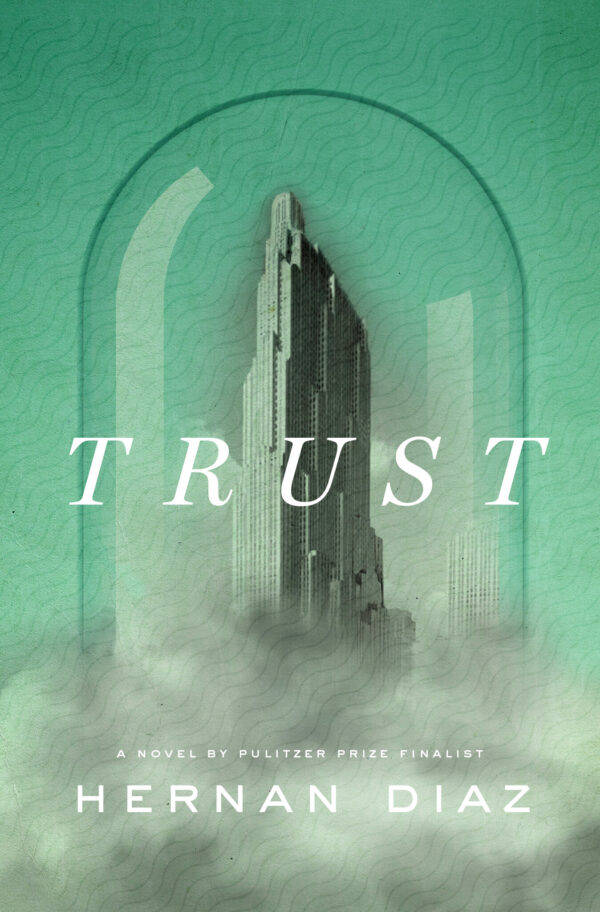While it’s impossible to say for sure, I’m going to make an educated guess in positing that Hernan Diaz’s Trust will not be the first book that anyone reads, even after reading this review it’s too random a choice. It’s not particularly short or easy, and while critically acclaimed (it jointly won a Pulitzer Prize), it’s nowhere near as popular as your average bestseller or beach read. This fact is important, as the built in expectations that come from having read even just one book are what makes Trust special. Plot twist: Trust is not really a book! While it is bound and advertised as one, between its covers are four separate works of writing which, while intimately related, are not just one novel. Trust’s main successes come from its subversion of the traditional structure of a novel, which while used in an impressive manner to relay a story of wealth and hidden truths, ultimately yields a tale that is passable at what it’s trying to do without ever truly reaching the heights that its elaborate style promises.
Trust centers two main ideas: the acquisition of wealth and how stories get told. A general synopsis might discuss how Trust is the story of a man who rises to the height of power through manipulation of the economy and the world around him, and the role that his wife plays in this story. We follow the lives of Benjamin and Helen Rask, who rise to a position of extreme wealth due to Benjamin’s extreme financial prowess. But everything is not as it seems. In this regard, the plot itself is pretty simple, but a general synopsis is an inadequate tool for describing Trust. The main draw of the book is its four distinct sections. Diaz starts with a traditional novel structure before transitioning to an incomplete version of an autobiography filled with blank sections and notes. He then leads into a memoir before ending with a diary. All are told from different perspectives, and some are fiction even within this fictional world. Unsurprisingly, this leads to moments of confusion and disorientation. Each section effectively broadens out and peels back another layer of the “true” story, but it’s not exactly clear what’s going on until reaching the third section. What follows is a very “meta” experience that involves discussions of the previous two sections, before Diaz narrows back in again in the last section, ending the book with a diary from the perspective of Helen Rask and revealing the final layer of truth behind each previous section.
There is no doubt that Trust‘s structure and formatting is experimental, especially in the general fiction sphere. While that in it of itself may be enough to engage some, structure is only one part of the reading experience. Ideas are what ultimately make a book. Considering its ultimate goal of discussing how stories get told, Trust‘s unique structure is masterful in slowly revealing the truth as new perspective after new perspective is told and not-so-hidden truths come to light. However, while that may be impressive, it’s also evident that Trust cares more about using its structure than telling a unique and engaging story. While Trust‘s ideas and main focus on discussing how history is told by those in power is sound and important, it is not original nor very different from other, similar stories. Its story, while engaging at points, is predictable and often underwhelming because of that predictability. The “truth” is not surprising, and so the slow revelations of Trust don’t work as well as they could. While stories about power imbalance need to be told, they need to be done in interesting ways that keep the reader engaged, and while Trust’s structure certainly helps, the story itself feels like an archetype for this kind of story rather than a fleshed out novel with unique and engaging characters. There’s not much new ground covered here, and that lack of depth beyond the basic topic keeps the book from being truly great. While structure does make Trust stand out, it can also make the book feel stagnant and draining. Trust must essentially retell its central story multiple times with slight variations to get its point across, and while switching from novel to diary to incomplete autobiography can help lessen the repetitiveness, it can still be hard to fight the encroaching boredom. This is amplified because Trust spells out its message pretty early on, and beyond that message, the story doesn’t take many risks.
Trust is an incredible achievement and an important experiment, but these setbacks keep it from being the awe-inspiring revelatory tale it seems to want to be. While Trust may still provide entertainment at the surface level, those familiar with similar stories and thematic throughlines will likely feel underwhelmed and disappointed by the relative simplicity of its plot and characters; it serves as a lesson that while experimental structure can succeed as a supplement, story is always essential.






